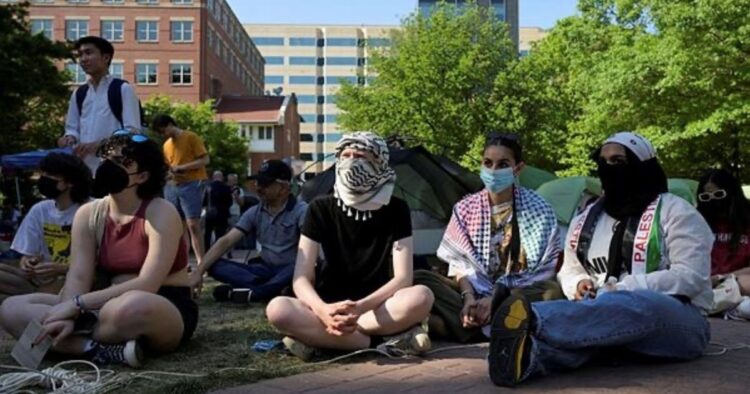Early Wednesday morning, police moved in to clear out a pro-Palestinian tent encampment at George Washington University in Washington, D.C. They arrested 33 protesters in the process. The eviction came after dozens of protesters marched to President Ellen Granberg’s home earlier in the day.
University officials had previously warned students that engaging in protest activities on the University Yard could lead to suspensions. The university stated that while it supports students’ rights to free expression, the encampment had become unlawful, with participants violating multiple university policies and city regulations.
ALSO READ: “Dutch Police Disperse Pro-Palestinian Camp as Campus Protests Sweep Europe”
Reports from local media indicated that some protesters were pepper sprayed as police prevented them from entering the encampment. The District of Columbia’s Metropolitan Police Department confirmed that arrests were made for assault on a police officer and unlawful entry.
A total of 33 people were taken into custody. The police department cited a “gradual escalation in the volatility of the protest” as the reason for dispersing the demonstrators.
On Tuesday evening, protesters marched to President Granberg’s home, carrying signs with slogans such as “Free Palestine” and “Hands off Rafah.” Police were called to manage the crowd, but no arrests were reported.
Meanwhile, Mayor Muriel Bowser and MPD Chief Pamela Smith are scheduled to testify about the District’s handling of the protest at a House Committee on Oversight and Accountability hearing later in the day.
This incident follows the eviction of a pro-Palestinian tent encampment at the University of Chicago on Tuesday. Administrators there, who initially took a permissive approach, expressed concerns about safety and announced the removal of the encampment.
University President Paul Alivisatos emphasized the importance of free speech but stated that disruptions to campus life cannot be tolerated.
Tensions between protesters and authorities have been escalating on campuses across the United States and Europe. The movement, which began nearly three weeks ago at Columbia University, has led to over 2,600 arrests on 50 campuses. While some universities have allowed protests to continue, others have called in police to address disruptions and ensure campus safety.
However, not all schools are taking a strict approach. Wesleyan University in Connecticut and the Rhode Island School of Design have shown support for on-campus demonstrations. Wesleyan’s President Michael Roth praised the protesters’ cause and affirmed their right to political expression, while the Rhode Island School of Design engaged in discussions with occupying students about their demands.
As campuses navigate how to handle the protests, tactics have ranged from appeasement to threats of disciplinary action.
At the University of Chicago, administrators gave protesters an ultimatum to leave or face removal, which resulted in law enforcement dismantling the encampment on Tuesday. The situation remains tense as police and protesters continue to clash over the issue.

















Comments